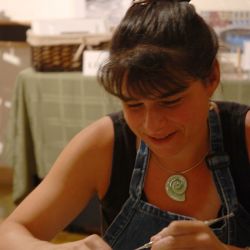Wheel thrown, hand pierced pottery
All of my pieces are wheel thrown and hand pierced. Everything is done by eye, without molds or templates. I initially pierce the piece about two hours after I throw it. I pierce it while it is still fairly wet so that it won’t crack. But the holes are much smaller at this point, so that the piece won’t collapse. I then go back when the piece is completely dry and the clay is rigid, and painstakingly enlarge each hole with a damp sponge. The water in the sponge erodes away the bone dry clay, allowing me to take away as much clay as possible
I love to push the medium as far as I can, seeing how little clay I can leave while still maintaining the structural integrity of the piece. People often ask me why they don’t collapse and I tell them that they often do. Most of the time the problems happen during the hottest part of the firing process. The clay becomes slightly molten and the more lacy pieces can slump or collapse. It is a careful balance between achieving the delicate appearance that I want and not creating a kiln disaster.
I also strive to blur the boundaries between form and function, and function and art. I was trained as a traditional, functional potter. I will probably always want to create tableware and functional pieces, but also can’t seem to resist rebelling against function, and the constraints and limitations of functional ware, just to see how far I can take the clay. It’s all about strength in the form of delicacy
